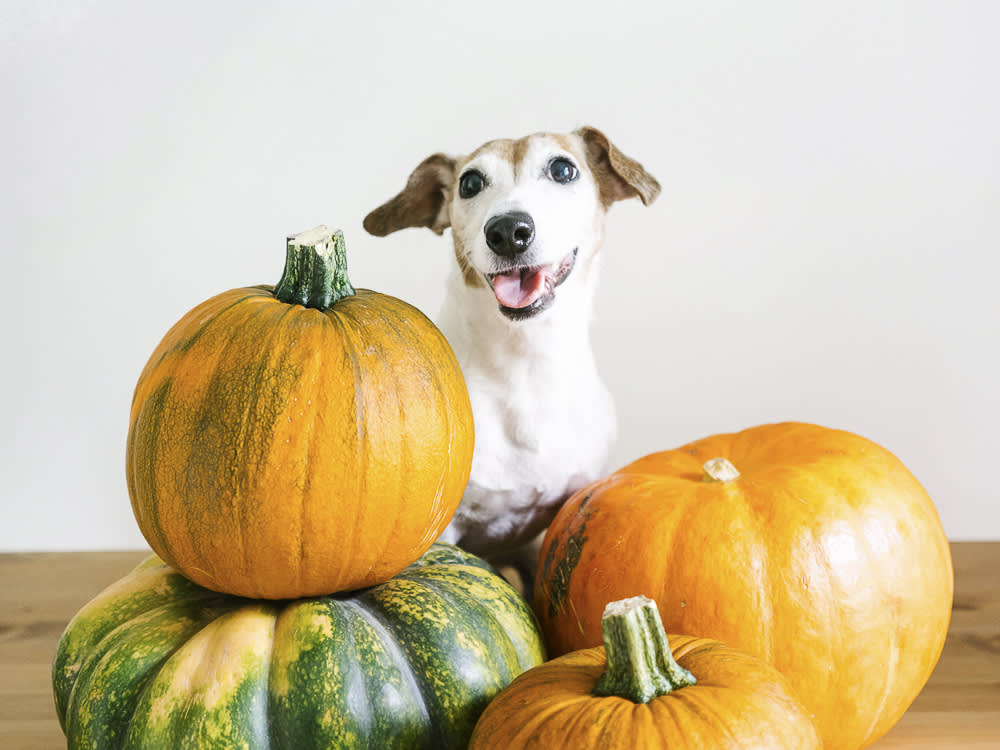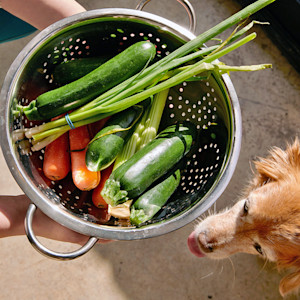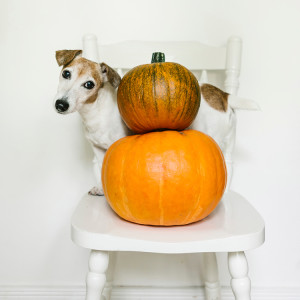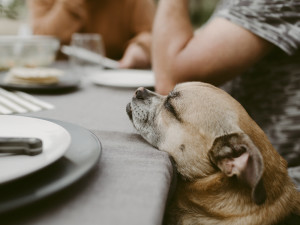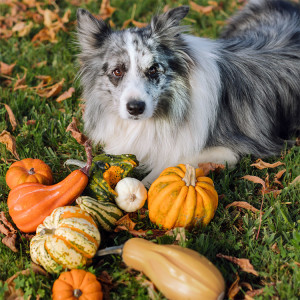Can Dogs Eat Pumpkin?
This superfood is delicious and full of nutrients—but how much is too much of a good thing?
In This Article:
Pumpkin for Dogs: Nutrition Facts and More How Much Pumpkin Can You Give a Dog to Eat? How to Prepare Pumpkin for Dogs
After a fall season full of pumpkin everything, you might be sick of it, but your dog is all about it. The good news is that it can be a great treat for them and even has excellent health benefits.
Pumpkin is safe and nontoxic for dogs to eat in small amounts, and provides some beneficial nutrients and health perks. However, it is not usually effective as a treatment for medical conditions. Read on to learn more about pumpkin for dogs.
How much do you spend on your pet per year?
Pumpkin for dogs: nutrition facts and more
Pumpkins are part of the gourd family, scientifically known as Cucurbitaceae. These are plants that grow on vines and produce berry-like fruit with hard rinds. Although pumpkins are technically safe when eaten raw in small amounts, they really need to be cooked in order to be tasty.
Raw pumpkins can be very bitter thanks to a compound called cucurbitacins found in all plants of this family. The flesh of the pumpkin can be sweet and tender when cooked properly and contains many beneficial nutrients, including fiber, magnesium, potassium, and vitamins C and B6. Pumpkin is a low-fat food with a large water content, making it relatively low in calories yet filling.
Are pumpkins good for dogs?
Pumpkins can be healthy for dogs in moderation, boosting their intake of nutrients such as fiber, vitamins, and minerals. Fiber can help create feelings of fullness without your pup eating high-calorie snacks. This can be helpful for dogs who need to lose weight for health reasons or to help maintain their weight over time.
Additionally, fiber can help promote a healthy gut and stabilize blood sugar, which is important for dogs with diabetes. Many of the vitamins and minerals in pumpkin — including magnesium, potassium, and vitamin B6 — also have important roles in daily biological functions. Because these are such important nutrients, all commercial dog foods that are labeled as complete and balanced will provide adequate amounts of these nutrients already. Any nutrients dogs get from snacks and treats are a bonus.
Although some pet parents use pumpkin as a therapeutic tool to help treat conditions like diarrhea or constipation, this is not usually as effective as other treatments, because pumpkin is not a concentrated form of fiber. In the quantities that most pets will eat it, pumpkin will not have a significant effect on their poop. For dogs who need fiber to treat medical conditions, consult a vet for guidance on which type of fiber is best and if you can use fiber supplements or high-fiber therapeutic diets to achieve the targeted dose.
Can dogs eat pumpkin?
Yes, pumpkin is safe and nontoxic for dogs in moderation and can even provide some health benefits. It is important to offer dogs plain pumpkin that has been cooked without added ingredients that may be unhealthy or toxic for them.
Can dogs eat canned pumpkin?
Plain, canned pumpkin is safe for dogs as long as it does not have other ingredients mixed in. Some forms of canned pumpkin are intended as pumpkin pie filling and may contain added sugar and salt, which are not healthy for dogs, alongside some spices that may even be toxic.
Can dogs eat pumpkin seeds?
Pumpkin seeds are nontoxic to dogs and can be safe in moderation with a few caveats. First, due to their shape and hard shell, they can be a choking hazard, especially for smaller dogs, so it is important to grind them up or supervise your dog closely if they are chewing on these seeds.
Second, it is important to make sure the pumpkin seeds are not baked with added salt or high-fat oils, which can be unhealthy for dogs. Finally, it is important to gradually introduce pumpkin seeds to your dog and only offer a small amount. The hulls of the seed are not digestible and can cause digestive upset like gas, decreased appetite, and/or diarrhea if they are eaten in large amounts.
Are pumpkins completely safe for dogs?
Plain, cooked pumpkin is completely safe for dogs as long as it is offered in moderation. As with any new food, it is important to introduce it to them slowly. Start with a small taste at first, and monitor your pup for signs of adverse reactions such as vomiting, diarrhea, or gas. Due to its fiber content, pumpkin may cause digestive upset for dogs who eat large amounts of it and are not accustomed to a high-fiber diet.
How much pumpkin can you give a dog to eat?
Pumpkin, like most snacks, supplements, and table foods, should be considered an occasional treat. It should not interfere with your dog’s primary dog food diet as their main source of nutrition. Dog food diets are formulated to contain all the daily nutrients that dogs need, according to guidelines.
When dogs eat too many snacks, table foods, and other treats, they may not eat enough dog food to get a proper balance of nutrients. This can put them at risk for nutritional deficiencies. To maintain proper nutrition, all treats and snacks should be less than 10 percent of a dog’s daily diet. Therefore, the amount of pumpkin a dog can eat will vary based on the size of the dog and their daily caloric intake.
Recommended quantity
The recommended quantity of pumpkin you should give a dog depends on their size and weight. As long as a dog is getting 90 percent of their diet from a complete and balanced dog food, that remaining 10 percent of their diet may come from a combination of treats and safe table foods, including pumpkin.
Pumpkin is a fibrous food, which means that it can be harder to digest, especially for dogs who do not typically eat lots of fiber in their diet. It is best to start with a very small amount of pumpkin and slowly increase that amount over time. This will allow your dog to adjust to the added fiber in their diet and minimize digestive upset.
Dogs’ size, weight, and dietary needs
It is always important to consider a dog’s size, weight, and dietary needs when it comes to offering them snacks, table foods, and especially when selecting their dog food diet. A dog has individualized needs based on their age, breed, and health conditions, which may influence how best to feed them.
Dogs who are on specialized diets to treat medical conditions may need to avoid eating certain kinds of treats, table foods, and snacks that could interfere with the efficacy of their diet. Small dogs have a much smaller caloric intake than large dogs and can be more at risk for nutritional deficits if they are eating lots of treats and table foods that fill them up. Dogs who are obese and on restricted calorie plans to lose weight may also need to avoid treats and table foods that are sources of added calories. Be sure to consult a vet about your dog’s particular needs, if you are unsure how all these factors should be addressed nutritionally.
How to prepare pumpkin for dogs
When it comes to offering pumpkin to dogs, plain and simple preparations are best. Dogs should not have high-fat oils or butter in their diet, which can lead to digestive upset or, more seriously, pancreatitis, in addition to weight gain. Pumpkin can be baked or steamed without any added ingredients and served in bite-sized pieces or mashed up, without the skin. Canned pumpkin is also safe for dogs as long as it does not contain any added ingredients.
Bottom line
Plain, cooked pumpkin is safe for dogs in moderation. Because pumpkin is a fibrous food, it should be introduced gradually to avoid digestive upset. Most dogs with digestive problems, such as constipation or diarrhea, will need a more targeted treatment — and pumpkin does not provide enough concentrated fiber to serve a therapeutic role in most of these situations.
FAQs
Can pumpkin help with dog diarrhea?
Pumpkin is unlikely to help with diarrhea in dogs. Most cases of diarrhea resolve on their own within a few days. When dogs need treatment for diarrhea, they are more likely to respond to targeted treatments for the specific, underlying cause — such as dewormers to get rid of parasites, probiotics to restore the gut microbiome, or high fiber treatments that contain much more fiber than pumpkin can provide.
Which are the best types of pumpkin to serve to your dog?
Plain, cooked pumpkin flesh is best for dogs. Fresh pumpkin can be cooked, cooled, and offered to dogs with the skin removed. Canned pumpkin is also a safe option as long as it does not contain any other ingredients.
Can you give your dog pumpkin every day?
It is OK to give dogs pumpkin daily as long as it is less than 10 percent of their total caloric intake and introduced gradually (to avoid digestive upset).
References
Cucurbita, North Carolina Extension Gardener. plants.ces.ncsu.edu/plants/cucurbitaopens in new tab.
Freeman, Lisa. The Problem with Pumpkin. Petfoodology, September 2017. sites.tufts.edu/petfoodology/2017/09/01/the-problem-with-pumpkinopens in new tab.
Winter Squash, Harvard School of Public Health: The Nutrition Source. nutritionsource.hsph.harvard.edu/food-features/winter-squashopens in new tab.
